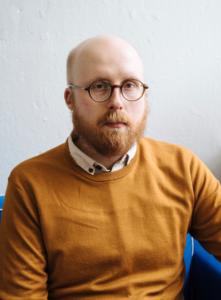I spent three wonderful months  at the CFS, from the beginning of November 2019 till the end of January 2020. Though I would have loved to stay longer, in retrospect my timing was most fortunate: when my departure was getting close, there were only a few cases of Covid-19 around Europe, and there was no talk of a global pandemic. Fast forward a few weeks, and both Denmark and Finland closed their borders and the universities went under lockdown.
at the CFS, from the beginning of November 2019 till the end of January 2020. Though I would have loved to stay longer, in retrospect my timing was most fortunate: when my departure was getting close, there were only a few cases of Covid-19 around Europe, and there was no talk of a global pandemic. Fast forward a few weeks, and both Denmark and Finland closed their borders and the universities went under lockdown.
Now I view my stay in Copenhagen like the calm before a storm. I knew I was in for a hectic spring when I returned to Helsinki, where I currently work as a postdoc, so I made sure to enjoy all the peace I had in Copenhagen. Little did I know how unusual the spring would turn out to be.
I came to the CFS to learn more about different models of subjectivity and self-consciousness. My background is in aesthetics and hermeneutic phenomenology, and I thought I needed more tools to deepen my understanding of certain questions that came up during my PhD project. I wrote my PhD on the phenomenology of aesthetic immersion – on those peculiar experiences where an artwork or some other aesthetic phenomenon consumes one’s attention to the extent that one’s sense of time, space, and place radically alters. One aspect of immersion that I didn’t dwell upon sufficiently is an experience I call aesthetic self-forgetfulness, which is often described in aesthetic literature but still far too little understood. This experience has to do with the situation where one becomes so deeply consumed by an aesthetic phenomenon that one is no longer present to oneself as the subject of the experience. Descriptions of such experiences enter aesthetic discourses during the 18th century (at the latest), and from thereon they have made steady appearances both in art theory and criticism – the most famous formulation being Arthur Schopenhauer’s theory of aesthetic experience in the third book of Die Welt als Wille und Vorstellung (1818). What strikes me odd in existing discussions – which tend to be very brief and sketchy – is that they very rarely stop to ask what precisely the “self” is that is forgotten in aesthetic self-forgetfulness. Indeed, to my knowledge the only explicit mention of this question is in Moritz Geiger’s brilliant, but nowadays all too little-known essay Beiträge zur Phänomenologie des ästhetischen Genusses (1913), and even Geiger merely touches the issue in passing. My interest lies in deciphering what precisely occurs in experiences of aesthetic self-forgetfulness and what such experiences tell us about the structure of selfhood. Furthermore, such experiences have affinities with other unusual experiences, such as mystical or flow experiences and even psychopathological self-disturbances, which are also characterised by some kind of alteration in self-consciousness. There thus rises question of how aesthetic immersion relates to and differs from these experiences.
One of the outcomes of my stay at the CFS was that I realized how the talk of self-forgetfulness is to some extent misguiding. This is because some pre-reflective layer of self-consciousness must remain intact even if deeply immersive situations bar reflective self-consciousness. This is testified by the fact that people can identify experiences of immersion as something that happened to them, even if they weren’t aware of themselves during the experience itself – if immersion entailed a complete annihilation of the self, this identification would not be possible. This it seems that the “self” that is forgotten in aesthetic self-forgetfulness is a more robust layer of selfhood – but precisely what that is remains to be worked out.
Though my stay at the CFS greatly benefited my current project, I think the real learning experiences lie elsewhere. During my stay, the Center was starting the new ERC-project “Who Are We?”. I have to confess I knew the mere rudiments of the phenomenology of intersubjectivity, so I found the weekly seminars and invited lectures on the topics very enlightening. However, I think that I came to understand the importance of we-experiences in a somewhat more practical manner. There is a very strong sense of community at the CFS, and I felt very welcome from my first day onwards. Doing research is often solitary work, and I greatly enjoyed the Center’s communal atmosphere, where people can think together, share ideas, and vent out frustrations. Now, having worked from home for almost three months with no end in sight, I cherish this sense of “we” that permeated my stay at the Center: the shared lunches, the Friday beers at the campus bar, the chats by the coffee machine – and even the charades at the Christmas dinner, where I made a fool of myself trying to mime a whale. Building such a feeling of togetherness is something I wish to carry forward into my own academic communities.